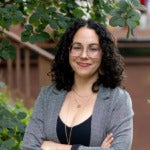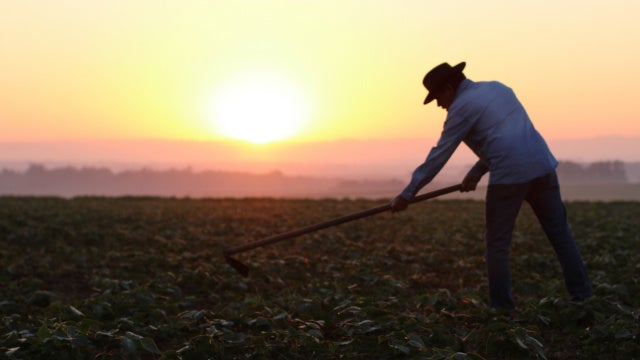Workers On the Line: Improving Jobs in Meat and Poultry Processing
Description
Meat and poultry processing are core to our food supply chain. According to the US Department of Agriculture, the average American consumes about 68 pounds of chicken, 48 pounds of pork, and 56 pounds of beef per year. Meanwhile, health and safety hazards are pervasive, and workers in these sectors face some of the harshest conditions in the US. They endure long hours on their feet, with few breaks, working with sharp tools at fast speeds. And they do so in cold, damp environments where exposure to various chemicals is common.Not surprisingly, severe injuries and even fatalities occur frequently. Adding insult to (literal) injury, many don’t receive the pay or benefits needed to be economically secure. These conditions affect some of our most vulnerable compatriots, including undocumented workers and even children who have been found to be working in these facilities. These challenges are not new — Upton Sinclair famously described them in “The Jungle” over 100 years ago — but they can be solved.
Join the Aspen Institute’s Food & Society Program and Economic Opportunities Program for a virtual conversation,“Workers on the Line: Improving Jobs in Meat and Poultry Processing,” on March 19 at 2 p.m. EDT. Panelists will discuss the challenges workers face, ideas for improving their jobs and well-being, and the policies and practices to reshape this industry and build a sustainable system where workers, consumers, and businesses thrive together.
Opening Remarks

Eric Schlosser
Journalist and Author of “Fast Food Nation” will provide opening remarks.
Eric Schlosser is an investigative journalist and the author of Fast Food Nation, Reefer Madness, and, most recently, Command and Control, which was a finalist for the Pulitzer Prize. He has written for Rolling Stone, The Atlantic, and The New Yorker, among others, and has received a number of journalism honors, including a National Magazine Award. Schlosser previously worked as a playwright for an independent film company. Two of his plays, Americans (2003) and We the People (2007), have been produced in renowned London theaters.
Speakers
 Shelly Anand
Shelly Anand
Co-Founder and Executive Director
Sur Legal Collaborative
Shelly Anand is the co-founder and executive director of Sur Legal Collaborative. The daughter of Indian immigrants and the granddaughter of refugees from the partition of India and Pakistan, Anand has been fighting for immigrants and workers in the deep south for over a decade as a legal aid attorney, a litigator with the US Department of Labor, and an immigrant rights attorney. In October 2020, she co-founded Sur Legal Collaborative, an immigrant and worker rights nonprofit legal organization, in response to the COVID-19 pandemic after seeing that many of her immigrant clients had been deemed essential workers and knew nothing about their labor rights, particularly in the safety and health context. At Sur Legal, in addition to managing day-to-day operations of a startup nonprofit, Anand shares her legal expertise around the Occupational Safety and Health Act and other federal labor laws with grassroots groups, immigrants, and working-class communities and assists with drafting and filing effective labor complaints with labor agencies like the Occupational Safety and Health Administration and the National Labor Relations Board.
She also assists immigrant workers with applications for immigration relief, including deferred action applications, and engages in national advocacy efforts to stop the labor abuse to deportation pipeline, whereby workers are retaliated against by their employers for exercising their whistleblower rights with calls to Immigration and Customs Enforcement and subsequent deportation. Anand is also a children’s book author who writes books she wishes she had growing up as a brown girl in the deep south. She received her Bachelor of Arts from Wellesley College and her Juris Doctor from the University of North Carolina School of Law in Chapel Hill. She lives with her husband and two children in Decatur, Georgia.
 Debbie Berkowitz
Debbie Berkowitz
Fellow, Kalmanovitz Initiative for Labor and the Working Poor
Georgetown University
Debbie Berkowitz is a worker safety and health policy expert and advocate. She was the director of the Worker Safety and Health Program Data Insights at the National Employment Law Project (NELP) for six years. While at NELP, she worked with national and state partners to develop successful policies and campaigns that improved conditions for vulnerable, low-wage workers in dangerous industries, including temporary workers and those in the meat, poultry, and food industry. Most recently, she helped lead campaigns for stronger state and federal standards to protect workers from COVID-19. She is the author of widely cited reports and research on model policies to improve worker safety and workers’ compensation systems.
Her past positions include serving as chief of staff and then the senior policy advisor for the Occupational Safety and Health Administration from 2009 to 2015. Berkowitz was also the health and safety director of the United Food and Commercial Workers Union and the health and safety director of the Food and Allied Service Trades Department of the AFL-CIO. She has testified before congressional and state legislative committee hearings, and her writing has been published in the Washington Post, Bloomberg BNA, Workers’ Compensation, Quartz, the Hill, and more. Berkowitz is regularly quoted by major news outlets for her expertise on worker safety and health. She is the recipient of numerous awards, including the American Public Health Association’s Alice Hamilton Award.
 Kim Cordova
Kim Cordova
President
UFCW Local 7
Kim Cordova was elected president of the United Food and Commercial Workers Union (UFCW) Local 7 in 2009 and is currently serving her fifth term. She is the first woman, in its 150-year history, to lead Local 7 and also serves as vice president of UFCW International. Cordova believes when there is a strong labor movement, there is a strong middle class – the key to rebuilding the economies of Colorado and Wyoming.
Cordova, a Local 7 union member for 39 years and counting, has dedicated her career to fighting for the health, safety, and well-being of working people. In 1985, while still in high school, she began her career as a grocery bagger for Safeway. While working at the store, she was held at gunpoint, an experience that sparked her passion for workplace safety. After eight years at Safeway, in several positions including stocker, checker, and baker, she was hired in 1993 as a Local 7 union organizer and later as a union representative. She served in that position until May 2009 when she returned to work at Safeway. Later in 2009 as a rank-and-file member, Cordova ran for president of UFCW Local 7 on a reform platform to implement ethical practices and other financial controls to restore credibility to Colorado’s largest private sector labor union. Following a stunning upset victory over a longtime incumbent, Cordova assumed office in 2010.
Throughout the COVID-19 pandemic, she has been a vocal advocate in calling for enforceable safety measures for her members, America’s essential workers. Under her leadership during the pandemic, the union has called for increased onsite COVID-19 testing, improved workplace safety measures, paid sick leave, and maintaining hazard pay until the danger has subsided for her members — many of whom are considered essential workers.
As one of the few Latinas elected to union leadership in the United States, Cordova is helping pave the way for a new generation of women of color in organized labor. UFCW Local 7 represents more than 25,000 grocery, meatpacking, food processing, health care, cosmetology, and barbershop workers in Colorado and Wyoming.Cordova resides in Denver with her family and two dogs. The family enjoys playing tennis, riding bikes, and driving in the mountains. She’s often cheering on her home state teams including the Denver Broncos, Denver Nuggets, Colorado Avalanche, and the Colorado Rockies.
Dr. Angela Stuesse
Associate Professor of Anthropology
University of North Carolina, Chapel Hill
Dr. Angela Stuesse is a cultural anthropologist and associate professor of anthropology at the University of North Carolina, Chapel Hill, where she directs the Graduate Certificate in Participatory Research. Much of her work has explored the structural conditions shaping the lives of immigrants and low wage workers in the United States. Her book, “Scratching Out a Living,” based on six years of politically engaged research with poultry workers and their allies, explores how this industry’s careful cultivation of a precarious labor force has impacted communities and prospects for worker organizing. Angela’s work has been featured in the New York Times, the Washington Post, the Los Angeles Times, USA Today, the Atlantic, the New Yorker, CNN, Univision, NPR, and dozens of other print, radio, TV, and multimedia outlets.
 Leah Douglas (Moderator)
Leah Douglas (Moderator)
Agriculture and Energy Policy Reporter
Reuters
Leah Douglas is the agriculture and energy policy reporter at Reuters, covering food and farm issues in federal policy, regulation, litigation, competition, labor, and more. Previously, they were a staff writer and associate editor at the Food and Environment Reporting Network, an independent, nonprofit newsroom. Douglas’ reporting has been published in the Guardian, the Nation, the Washington Post, Mother Jones, NPR, the American Prospect, Time, and other outlets. Their reporting has been cited in dozens of print and television media outlets, including the New York Times, the Washington Post, the Associated Press, NBC Nightly News, and John Oliver’s “Last Week Tonight.” Douglas has received fellowships from UC Berkeley, Vermont Law and Graduate School, Institute for Journalism and Natural Resources, and the New Economies Reporting Project. They have won awards from the National Association of Agricultural Journalists for feature and investigative reporting, and they were the 2020 recipient of the National Farmers Union Milt Hakel Award for excellence in agricultural reporting.
Opportunity in America
Opportunity in America, an event series hosted by the Economic Opportunities Program, considers the changing landscape of economic opportunity in the US and implications for individuals, families, and communities across the country. The series highlights the ways in which issues of race, gender, and place exacerbate our economic divides, and ideas and innovations with potential to address these challenges and broaden access to quality opportunity.
Learn More
The Economic Opportunities Program advances strategies, policies, and ideas to help low- and moderate-income people thrive in a changing economy. Follow us on social media and join our mailing list to stay up-to-date on publications, blog posts, events, and other announcements.
Food & Society at the Aspen Institute brings together public health leaders, policymakers, researchers, farmers, chefs, food makers, and entrepreneurs to find practical solutions to food system challenges and inequities. Learn more at https://www.aspeninstitute.org/programs/food-and-society-program/
Watch the first event in this series
view past event
